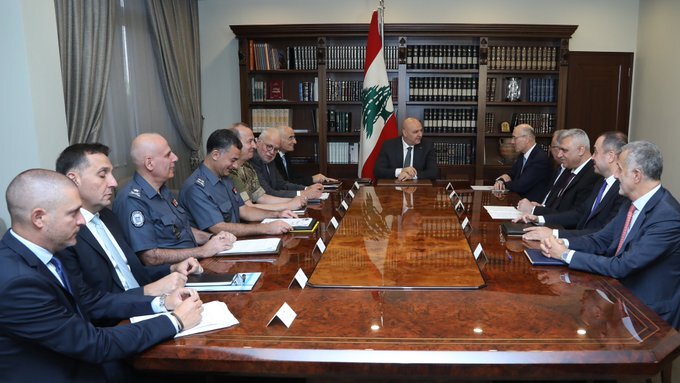Security-judicial meeting in Beirut on Syrian prisoners

BEIRUT — Amid escalating pressure from the HTS–led regime to extradite Syrian prisoners from Lebanon, President Joseph Aoun held a second security meeting to address the issue.
Reportedly, the meeting came in response to a request from Syria’s Foreign Minister, Asaad al-Sheibani, to receive tangible positive signals from the Lebanese side to visit Beirut.
The meeting was attended by the heads of the security and judicial bodies, as well as Judge Raja Abi Nader, the supervisor of prisons at the Ministry of Justice.
It is worth noting that the meeting did not address Syrians linked to terrorist organizations or involved in killing about 350 Lebanese soldiers and civilians.
Syrian prisoners constitute approximately 30% of the total prison population under the jurisdiction of the Lebanese Ministry of Justice.
The number of prisoners in Lebanon is approximately 2,600.
So far, 380 have been given final sentences, 370 partial sentences or their cases are pending, while the rest are still under trial.
The advisors emphasized that it is illegal to hand over these detainees unless final judgments are issued against them. They proposed studying a judicial cooperation agreement that would oblige Lebanon to hand over convicts (specifically those not convicted of terrorist or security-related crimes) to complete their prison sentences in Syria.
In this context, it was further learned that Lebanese security services have begun preparing detailed lists of the names of Syrian prisoners in their custody (classified according to the charges against them).
While the relevant ministers and a number of advisors were present, Prime Minister Nawaf Salam was notably absent, without an explanation despite the importance of the meeting.
Justice Minister Adel Nassar, Prisons Supervisor Judge Raja Abi Nader, and Public Prosecutor Judge Jamal Hajjar emphasized the impossibility of handing over detainees before their trial, emphasizing the need to strictly implement Article 108 of the Code of Criminal Procedure, which prohibits exceeding the specified period of pretrial detention in order to expedite trials.
Amid the heightened tensions in Syria and the crimes committed by Ahmed al-Sharaa’s forces against civilians, Lebanon has witnessed security tensions (such as blockade of major roads and violent demonstrations) and hate speech. These events prompted the Army chief to call on the Lebanese people to avoid strife and prioritize supreme national interests over all other things. Rodolph Haykal promised the Army would not allow “any breach of security or violation of civil peace.”
The Lebanese Army stressed that overcoming the current problems that Lebanon is experiencing requires “the unity and solidarity of the Lebanese people, and their awareness of the gravity of the situation.”
“Lebanon is currently facing a set of exceptional circumstances, most notably the continued attacks and violations of national sovereignty by the Israeli enemy, in addition to the challenges of maintaining internal security and border control, as well as complex developments in the region.”
While warning against “undertaking any action that could have unintended repercussions on the security of the Lebanese,” the Lebanese Army emphasized the need to “exercise responsibility” in confronting this delicate situation.
Leave a Comment